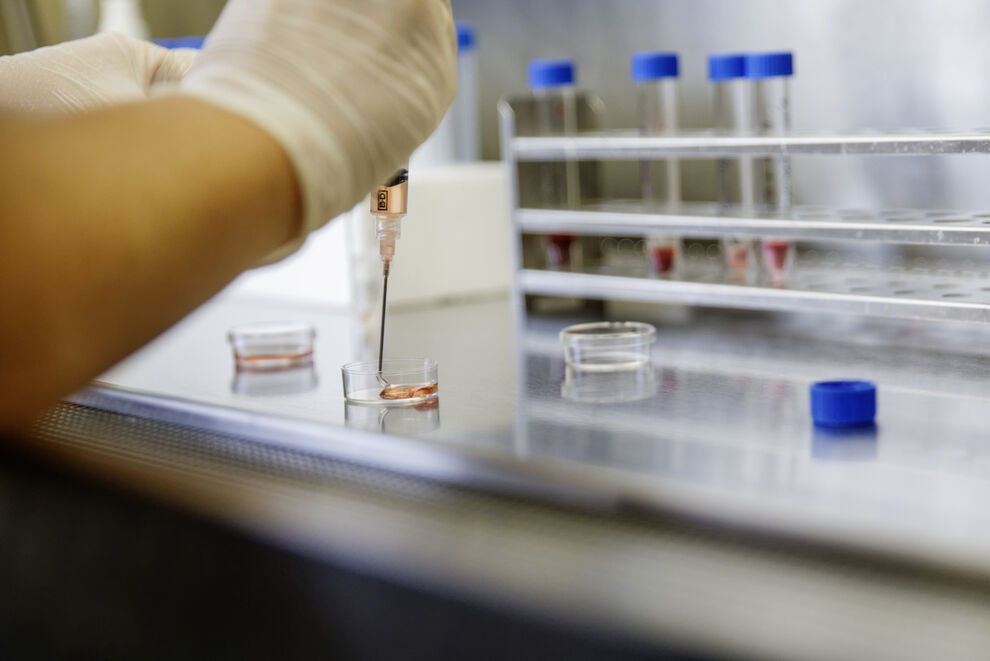Research Focus
The research activities of our group are aimed towards the identification and characterization of mechanisms underlying the maturation arrest of leukemic cells. We especially focus on epigenetic factors preventing the induction of myeloid differentiation by ATRA in non-APL AML. In a current project we investigate how inhibition of the histone 3 lysine 4 mono/di demethylase LSD1 enables ATRA-driven differentiation in non-APL AML.
Publications
M. Kahl, A. Brioli, M. Bens, F. Perner, A. Kresinsky, U. Schnetzke, A. Hinze, Y. Sbirkov, S. Stengel, G. Simonetti, G. Martinelli, K. Petrie, A. Zelent, F. Boehmer, M. Groth, T. Ernst, F. Heidel, S. Scholl, A. "Hochhaus, and T. Schenk, “The acetyltransferase GCN5 maintains ATRA-resistance in non-APL AML”, Leukemia, Epub ahead of print, https://doi.org/10.1038/s41375-019-0581-y.
A. Steube, T. Schenk, A. Tretyakov, and H. P. Saluz, “High-intensity UV laser ChIP-seq for the study of protein-DNA interactions in living cells”, Nature Communications, vol. 8, article 1303, Nov. 2017.
S. Göllner, T. Oellerich, S. Agrawal-Singh, T. Schenk, H.-U. U. Klein, C. Rohde, C. Pabst, T. Sauer, M. Lerdrup, S. Tavor, F. Stölzel, S. Herold, G. Ehninger, G. Köhler, K.-T. T. Pan, H. Urlaub, H. Serve, M. Dugas, K. Spiekermann, B. Vick, I. Jeremias, W. E. Berdel, K. Hansen, A. Zelent, C. Wickenhauser, L. P. Müller, C. Thiede, and C. Müller-Tidow, “Loss of the histone methyltransferase EZH2 induces resistance to multiple drugs in acute myeloid leukemia”, Nature Medicine, vol.23, pp. 69-78, Jan 2017.
T. Schenk, S. Stengel, and A. Zelent, “Unlocking the potential of retinoic acid in anticancer therapy.”, British Journal of Cancer, 111(11):2039-45, Nov. 2014.
T. Schenk, W. C. Chen, S. Göllner, L. Howell, L. Jin, K. Hebestreit, H.-U. Klein, A. C. Popescu, A. Burnett, K. Mills, R. a Casero, L. Marton, P. Woster, M. D. Minden, M. Dugas, J. C. Y. Wang, J. E. Dick, C. Müller-Tidow, K. Petrie, and A. Zelent, “Inhibition of the LSD1 (KDM1A) demethylase reactivates the all-trans-retinoic acid differentiation pathway in acute myeloid leukemia.”, Nature Medicine, vol. 18, no. 4, pp. 605–11, Apr. 2012.
C. L. Alvares, T. Schenk, S. Hulkki, T. Min, G. Vijayaraghavan, J. Yeung, D. Gonzalez, C. W. E. So, M. Greaves, I. Titley, K. Bartolovic, and G. Morgan, “Tyrosine kinase inhibitor insensitivity of non-cycling CD34+ human acute myeloid leukaemia cells with FMS-like tyrosine kinase 3 mutations”, British Journal of Haematology, vol. 154, no. 4, pp. 457–65, Aug. 2011.
E. F. Farias, K. Petrie, B. Leibovitch, J. Murtagh, M. B. Chornet, T. Schenk, A. Zelent, and S. Waxman, “Interference with Sin3 function induces epigenetic reprogramming and differentiation in breast cancer cells.,” Proceedings of the National Academy of Sciences of the United States of America, vol. 107, no. 26, pp. 11811–6, Jun. 2010.
T. Schenk, S. Stengel, S. Goellner, D. Steinbach, and H. P. Saluz, “Hypomethylation of PRAME is responsible for its aberrant overexpression in human malignancies,” Genes, Chromosomes & Cancer, vol. 804, no. April, pp. 796–804, 2007.
S. Goellner, D. Steinbach, T. Schenk, B. Gruhn, F. Zintl, E. Ramsay, and H. P. Saluz, “Childhood acute myelogenous leukaemia: association between PRAME, apoptosis- and MDR-related gene expression.,” European journal of cancer (Oxford, England : 1990), vol. 42, no. 16, pp. 2807–14, Nov. 2006.
Funding
Landesgraduiertenstipendium (Faezeh Zadegan)



